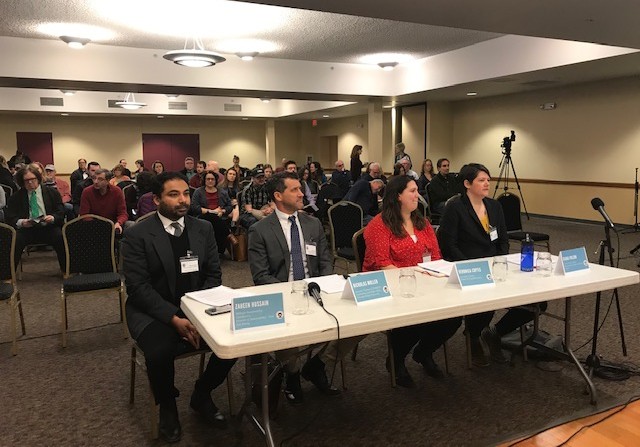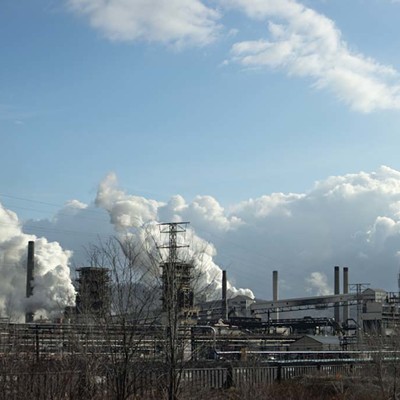On Wednesday, a town hall in Millvale hosted by state Rep. Sara Innamorato (D-Lawrenceville) tried to add some nuance to those arguments.
“So often we are asked, do we stand with the environment or do you stand with jobs?” said Innamorato at the town hall in the Millvale Community Center. “I reject this narrative. It is false and it is antiquated.”
The town hall had two panels of four speakers each. They included environmental activists, economists, and public-health researchers. The panelists provided testimony on the costs and consequences associated with the petrochemical industry and the fracked natural gas that feeds it. And a group of elected officials listened to that testimony and then asked questions of the panelists. They also took questions from the audience.
The biggest talking point of the event was House Bill 1100, a bill that would potentially provide billions in tax breaks to petrochemical companies that exceed a certain threshold of capital investment and jobs. Innamorato voted against HB 1100, which cleared the state legislature with bipartisan support, but is facing a likely veto from Gov. Tom Wolf (D-York).
Innamorato said her vote does not mean she is against family-sustaining union jobs, as the proponents of HB 1100 have claimed of the bill's detractors. “We can be against corporate giveaways like HB 1100 and also be for good union jobs, family-sustaining jobs,” said Innamorato.
She added that her district, which stretches from Bloomfield to Ross and east to Aspinwall, is unlikely to see a fracking well pad or a cracker plant, but that the natural gas and petrochemical industries will have an effect on the entire commonwealth.
Melissa Troutman of environmental group Earthworks said that cracker plants, which refine natural gas into plastic pellets, produce very toxic waste that needs treatment before being discharged into waterways. Troutman said her review of the environmental permits show some potential accountability issues concerning the disposal of hazardous waste with the cracker plant currently under construction in Beaver County.
“All of these toxic chemicals are going into the water, into a waterway that is already being polluted,” said Troutman of the Ohio River.
Troutman was also critical of HB 1100. The potential long-term costs if that bill were to be signed into law is close to $1 billion. Troutman said the potential HB 1100 costs could help the Department of Environmental Protection plug 600 abandoned fracking wells a year. She said the current DEP plugging liability ranges from $280 million to $6.6 billion.
Matt Mehalik of the Breathe Project noted the air pollution costs when the cracker plant comes online, and how those will only be exacerbated if more are built in the region.
Pittsburgh already has some of the worst air quality in the country, and the Beaver County cracker plant will add 2.2 million tons of carbon dioxide each year, the equivalent of adding more than 480,000 cars.
And beyond that, Mehalik noted how oil and gas companies have showed they are not bullish on the Pittsburgh region anymore. Chevron has recently walked away from $11 billion in holdings and laid off hundreds of people. And local natural gas company EQT is trading on the stock market at its lowest levels in 25 year history.
“This is a bad move,” said Mehalik of HB 1100. “This is an industry that does not deserve subsidies.”
Legislators and elected officials in attendance included Innamorato, Allegheny County Councilor Bethany Hallam (D-Ross), state Sen. Lindsey Williams (D-West View), a Pittsburgh Mayor Bill Peduto staffer, and state Reps. Melissa Shusterman (D-Chester) and Danielle Friel Otten (D-Chester).
Also in attendance was Allegheny Fayette Labor Council president Darrin Kelly. Several unions within the AFLC have been supportive of HB 1100, as well as the fracking and petrochemical industry, which employs many of its members. Kelly said he accepted an invitation from Innamorato and was excited to be there.
The Pittsburgh environmental community and the labor unions with members in fossil fuel industries have been at odds over the fracking industry. Environmentalists have advocated for the Green New Deal as a way to transition away from reliance on fossil fuels, while unions working in the fossil-fuel industry have not embraced that plan.
But about 30 minutes into the town hall, Kelly abruptly left the Millvale community center. He told Pittsburgh City Paper later that his exit was promoted by Friel Otten. He said he couldn't be in the same room as her because of a tweet she made last year about natural gas pipeline workers.
In a now-deleted tweet from April 2019, Friel Otten replied to a tweet pointing out a protest she was participating in where pipeline workers were blocked from attending the worksite. Her tweet said, “The nazis were just doing their jobs too.” The Pennsylvania GOP called for her resignation and some Democratic officials also criticized Friel Otten. In May 2019, Friel Otten told WHYY that her tweet was misconstrued and was not meant to compare pipeline workers to Nazis. She later apologized for the tweet and called it “insensitive.”
“I can’t be in a room with Danielle Friel Otten after she said those things about my union members,” said Kelly. “And I hope to be in the next meeting when we get together.”
Friel Otten responded to Kelly’s exit on Twitter saying Kelly “had the every opportunity to sit [with] the struggle and have an adult conversation.”
Innamorato said she wished Kelly would have stayed for the entire town hall, but added she looks forward to sharing the information with him at a later date.Progressive anti-pipeline Philly suburban lawmaker gets into Twitter spat with Western PA labor leader ⬇️⬇️ pic.twitter.com/L9YLnN9E2s
— Stephen Caruso (@StephenJ_Caruso) March 5, 2020
In the second half of the town hall, Diana Polson of nonpartisan policy research group the Pennsylvania Budget and Policy Center (PBPC) said HB 1100 could provide $22 million a year per petrochemical plant up until 2050.
She said the PBPC estimates this would equate to a cost of $8.8 million per permanent job the plants create. Polson criticized HB 1100 as unnecessary and said that nine out of 10 companies looking to locate in Pennsylvania do so regardless of subsidies.
Polson also questioned the impact of the petrochemical build-out in Pennsylvania in terms of employment. She said PBPC looked at Texas, which has a mature petrochemical industry, and noted that jobs in the the petrochemical field only represent one out of every 650 jobs in Texas.
Carnegie Mellon economist Nick Muller presented research he had recently completed on the region’s natural gas industry. His research found that between 2004-2016, fracking boosted the regional economy by $21 billion, however it was also related to $23 billion in costs related to premature deaths linked to industry-caused air pollution.
Muller said that as an economist he wasn't suggesting a ban on fracking as some in the region have called for. But he did suggest that a severance tax could help mitigate the costs associated with the industry.


















